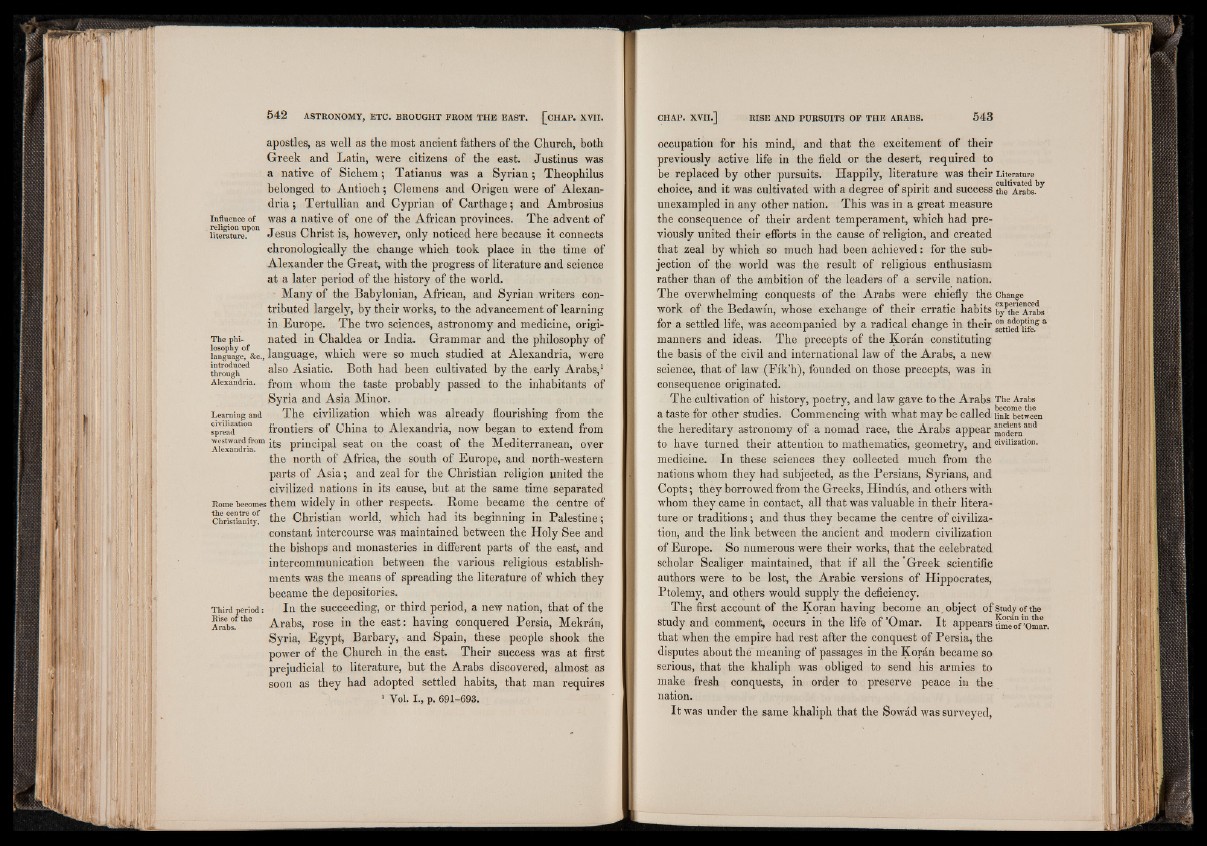
apostles, as well as the most ancient fathers of the Church, both
Greek and Latin, were citizens of the east. Justinus was
a native of Sichem; Tatianus was a Syrian; Theophilus
belonged to Antioch; Clemens and Origen were of Alexandria
; Tertullian and Cyprian of Carthage; and Ambrosius
influence of was a native of one of the African provinces. The advent of
literature. Jesus Christ is, however, only noticed here because it connects
chronologically the change which took place in the time of
Alexander the Great, with the progress of literature and science
at a later period of the history of the world.
Many of the Babylonian, African, and Syrian writers contributed
largely, by their works, to the advancement of learning
in Europe. The two sciences, astronomy and medicine, origi-
The phi- nated in Chaldea or India. Grammar and the philosophy of
language” &c., language, which were so much studied at Alexandria, were
throughed also Asiatic. Both had been cultivated by the early Arabs,1
Alexandria. from whom the taste probably passed to the inhabitants of
Syria and Asia Minor.
Learning and The civilization which was already flourishing from the
spread*110" frontiers of China to Alexandria, now began to extend from
Alexandria”"1 ^ principal seat on the coast of the Mediterranean, over
the north of Africa, the south of Europe, and north-western
parts of Asia; and zeal for the Christian religion united the
civilized nations in its cause, but at the same time separated
Rome becomes them widely in other respects. Rome became the centre of
Christianity!" the Christian world, which had its beginning in Palestine ;
constant intercourse was maintained between the Holy See and
the bishops and monasteries in different parts of the east, and
intercommunication between the various religious establishments
was the means of spreading the literature of which they
became the depositories.
Third period: In the succeeding, or third period, a new nation, that of the
Arab”! Arabs, rose in the east: having conquered Persia, Mekran,
Syria, Egypt, Barbary, and Spain, these people shook the
power of the Church in the east, Their success was at first
prejudicial to literature, but the Arabs discovered, almost as
soon as they had adopted settled habits, that man requires
‘ Vol. I., p. 691-693.
occupation for his mind, and that the excitement of their
previously active life in the field or the desert, required to
be replaced by other pursuits. Happily, literature was their Literature
choice, and it was cultivated with a degree of spirit and success the* Arabs.by
unexampled in any other nation. This was in a great measure
the consequence of their ardent temperament, which had previously
united their efforts in the cause of religion, and created
that zeal by which so much had been achieved: for the subjection
of the world was the result of religious enthusiasm
rather than of the ambition of the leaders of a servile nation.
The overwhelming conquests of the Arabs were chiefly the change
work of the Bedawin, whose exchange of their erratic habits byPtheeArabs
for a settled life, was accompanied by a radical change in their a
manners and ideas. The precepts of the Koran constituting
the basis of the civil and international law of the Arabs, a new
science, that of law (Fik’h), founded on those precepts, was in
consequence originated.
The cultivation of history, poetry, and law gave to the Arabs The Arabs
a taste for other studies. Commencing with what may be called link between
the hereditary astronomy of a nomad race, the Arabs appear modema"d
to have turned their attention to mathematics, geometry, and civilization,
medicine. In these sciences they collected much from the
nations whom they had subjected, as the Persians, Syrians, and
Copts; they borrowed from the Greeks, Hindus, and others with
whom they came in contact, all that was valuable in their literature
or traditions; and thus they became the centre of civilization,
and the link between the ancient and modern civilization
of Europe. So numerous were their works, that the celebrated
scholar Scaliger maintained, that if all the Greek scientific
authors were to be lost, the Arabic versions of Hippocrates,
Ptolemy, and others would supply the deficiency.
The first account of the Koran having become an. object of study of the
study and comment, occurs in the life of ’Omar. It appears fm^oromar.
that when the empire had rest after the conquest of Persia, the
disputes about the meaning of passages in the Koran became so
serious, that the khaliph was obliged to send his armies to
make fresh conquests, in order to preserve peace in the
nation.
It was under the same khaliph that the Sowiid was surveyed,